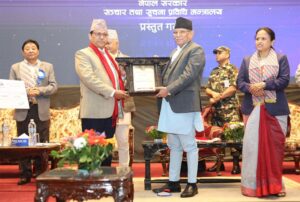Educationpatra, Kathmandu. Guru Purnima, also known as Ashad Shukla Purnima, is being celebrated across the country today. This auspicious day holds deep respect for the teachers who give us the gift of education and wisdom.

Since the Vedic period, Vyasa Jayanti has been observed on this occasion, commemorating the birth anniversary of Ved Vyasa, the revered author of the epic scripture, Mahabharata. Ved Vyasa’s profound contributions to Hindu culture through his writings of religious texts such as Vedanta, Athar Purana, and Upanishads make him an embodiment of knowledge and enlightenment, elevating Guru Purnima to great significance.
The term “Guru” in Sanskrit carries a profound meaning, symbolizing the one who dispels darkness and illuminates the path of knowledge. A Guru is the guiding light who removes ignorance and imparts wisdom to his disciples.
In this time-honored tradition, disciples pay homage to their Gurus by offering various sweets and treating them with utmost reverence, considering them as their mother and father figures. It is a gesture of deep gratitude and respect towards the teachers who have imparted education, skills, and wisdom in their lives.
On the sacred day of Asar Shukla Purnima, the Guru Purnima festival is celebrated with great enthusiasm. Students participate in the chudakarma ritual, where they donate the Gayatri mantra, showcasing their respect for the Gurus who have imparted knowledge and skills to them.
During Ved Vyasa Jayanti, an eternal tradition is followed, acknowledging Vyasa as the chief among the eight Chiranjeevis (immortals) and revering him as the ultimate Guru. Thus, this Purnima is observed as Guru Purnima in honor of Ved Vyasa’s birth anniversary.
At the renowned Pashupatinath Temple, the Guru Dakshina idol is worshipped once a year on this auspicious day. It symbolizes the essential role of a teacher in all fields, whether it be theoretical, technical, spiritual, or yogic. The commencement of any form of education is considered incomplete without the guidance of a Guru.
In the sacred scriptures, Gurus hold a position of utmost reverence, often described as Guru Brahma, Guru Vishnu, and Gurudev Maheshwar. The scriptures emphasize the equal importance of parents and Gurus in one’s life journey.
The word “Guru” itself holds a profound meaning in Sanskrit, representing the removal of darkness. It signifies the dispelling of ignorance and the acquisition of knowledge, making the Guru an essential pillar of enlightenment.
As Kathmandu resonates with the celebrations of Guru Purnima, this day serves as a reminder to express our gratitude and pay homage to the teachers who have played an instrumental role in shaping our lives through their wisdom and guidance. Let us embrace the teachings of our Gurus and continue to seek knowledge, illuminating our paths towards a brighter and enlightened future.









